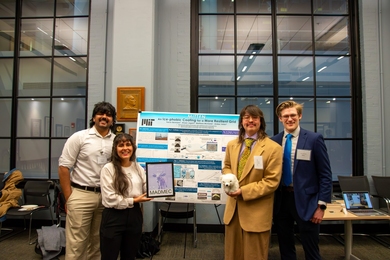CAMBRIDGE, Mass., Feb. 28 -- MIT today announced the creation of the McGovern Institute for Brain Research, made possible by a gift from International Data Group (IDG) Founder and Chairman Patrick J. McGovern, Jr., and his wife, entrepreneur Lore Harp McGovern.
The gift is expected to total $350 million over the next 20 years. The February 18 edition of The Chronicle of Higher Education reported that the previous largest gift to a university was $300 million.
Charles M. Vest, president of the Massachusetts Institute of Technology, said at a signing ceremony at MIT, "Creation of the McGovern Institute for Brain Research will launch one of the most profound and important scientific ventures of the next century and what surely will be a cornerstone of MIT's scientific contributions in the decades ahead. We are deeply grateful to Pat and Lore Harp McGovern for their visionary commitment to MIT and for their extraordinary leadership as philanthropists."
The new institute's mission is aggressive exploration of human learning and communication through interdisciplinary research that encompasses neuroscience, molecular neurobiology, bioengineering, cognitive sciences, computation and genetics. Widely seen as the next new frontier of science, these areas of study have profound implications for human health and quality of life. New technology has opened new frontiers. For example, Functional Magnetic Resonance Imaging allows scientists, for the first time in history, to observe the brain at work from the inside in extraordinary detail.
Mr. McGovern said that he and his wife decided to devote a major portion of their wealth to brain research because they believe that neuroscience is poised to make major advances in understanding the human mind and behavior.
Mr. McGovern has had a lifetime interest in understanding the brain and its impact on human behavior. He received his S.B. degree in 1959 from MIT, where his major was life sciences with a special interest in neurophysiology and the organization and function of the human nervous system. He took computer science courses to contribute to developing computational models for the function of neural networks.
Mr. McGovern founded IDG, the world's leading computer publishing, research and exposition management company, in 1964. He has launched more than 290 computer magazines and newspapers in 80 countries, including Computerworld, The Industry Standard, and PC World.
Looking back to his student days at MIT, Mr. McGovern recalled, "I was thrilled to study the physical basis of consciousness. Now, the development of powerful new tools such as whole brain imaging allows researchers to address the daunting complexity of the mammalian brain and to begin to understand the biological basis for human thought, language and behavior," he said.
"Within the next 20 years as we move into the knowledge economy, we hope that the interdisciplinary research at the McGovern Institute will lead to improvements in receiving, analyzing, associating, storing, retrieving and communicating information. These scientific advances will result in enhancements to the standard of living and quality of life around the world," he said on the occasion of signing the memorandum of understanding Monday at MIT. He has been a member of the MIT Corporation (the university's board of trustees) since 1989 and a life member of the Corporation since 1998.
Lore Harp McGovern commented, "The process of setting up the McGovern Institute for Brain Research has been an incredible journey, one that has not only introduced me to extraordinary scientists, but also aroused an enormous appetite to learn more about every aspect of the brain. I have been Chairman of the Board of Associates at the Whitehead Institute for Biomedical Research for the last three years, and I have seen how much scientific progress can be achieved in an institute dedicated to a specific mission. It is my hope that in our lifetime we will be able to point proudly to the McGovern Institute for Brain Research and its important contributions to enhancing human learning, communications and quality of life."
Mrs. McGovern has been involved in the technology field since the early 1970s. A co-founder in 1976 of Vector Graphics, one of the earliest PC companies, she is currently involved with numerous start-up ventures in Silicon Valley.
Robert Birgeneau, Dean of Science at MIT from 1991 until this year, said, "Expansion of research, teaching and educational opportunities in the neurosciences has been a strategic priority of the School of Science at MIT for several years, and MIT is poised to become a leading player in defining and advancing this critical new field. The McGovern Institute adds momentum to our plans as well as force to our pioneering research in the neurosciences."
A NOBEL LAUREATE'S LEADERSHIP
The McGovern Institute's founding director will be Phillip A. Sharp, an internationally renowned molecular biologist who won the Nobel Prize in 1993 for his discovery of surplus DNA and gene-splicing. A member of the MIT faculty since 1970, Professor Sharp was Director of the Center for Cancer Research from 1985 to 1991 and head of the Department of Biology from 1991 to 1999.
"The McGovern Institute will do ground-breaking research on how the brain works," Professor Sharp said. "It will allow us to move to a new level of pre-eminence in neuroscience. This is an exciting addition to the MIT community that will enrich the body of existing work at MIT in neurosciences, imaging technology, and molecular, cellular and genetic science."
As founding director, Professor Sharp will assemble a team of 16 McGovern Investigators, including 10 new faculty. All the investigators will hold faculty appointments in academic departments at MIT such as brain and cognitive science, biology, electrical engineering and computer science, linguistics and bioengineering. The new institute will also offer unique interdisciplinary learning opportunities for both undergraduate and graduate students, in keeping with MIT's commitment to integrating research and teaching at all levels.
A WEALTH OF RESOURCES
MIT already possesses a wealth of resources in the fields related to brain research.
The synergy generated by a community of world-class researchers investigating various aspects of the brain, mind, learning and memory makes MIT an ideal setting for the new institute. MIT's existing activities in the neurosciences include the Department of Brain and Cognitive Sciences (BCS), led by Professor Mriganka Sur; the Center for Learning and Memory (CLM), led by Professor of Biology Susumu Tonegawa, winner of the 1987 Nobel Prize for his work in immunology; the RIKEN-MIT Neuroscience Research Center, established within CLM; and the Martinos Imaging Center, which will develop new imaging technologies.
The Brain and Cognitive Sciences major is one of the fastest-growing majors at MIT. Commenting on the growth of interest in neuroscience and on the possibilities for future research at the McGovern Institute, Mrs. McGovern said, "To be able to play a role in the drama of discovery in the field of neuroscience and to give researchers and students a venue in which to decipher the intricate machinery of the human brain is incredibly stimulating and exciting to me. I am thankful that the dream Pat and I share can be actualized."
Mr. McGovern noted, "We hope the research at the McGovern Institute will be able to expand the understanding of the processes controlling human perception, memory, emotions and communication."
THE McGOVERN INSTITUTE
Funding for the McGovern Institute will be provided by the new McGovern Institute Foundation. A new building to house the institute will be constructed on the MIT campus.
BACKGROUND ON IDG
Headquartered in Boston, International Data Group (IDG) informs more people worldwide about information technology than any other company in the world. With annual revenues of $2.56 billion, IDG is the leading global provider of IT media, research, conferences and expositions. IDG publishes more than 290 computer newspapers and magazines and 4,000 book titles in 80 countries, led by the Computerworld/InfoWorld, Macworld, Network World, PC World, CIO, Channel World and For Dummies��� global product lines. IDG offers online users the largest network of technology-specific sites around the world through IDG.net (http://www.idg.net), which comprises more than 250 targeted Web sites in 55 countries. IDG is also a leading producer of 168 computer-related expositions in 35 countries, and research arm International Data Corporation (IDC), provides computer industry research and analysis through 49 offices in 42 countries worldwide. Company information is available at http://www.idg.com.
BACKGROUND ON MIT
The Massachusetts Institute of Technology is one of the world's preeminent research universities, dedicated to advancing knowledge and educating students in science, technology, and other areas of scholarship that will best serve the nation and the world in the 21st century. It is known for rigorous academic programs, cutting-edge research, a diverse campus community, and its longstanding commitment to working with the public and private sectors to bring new knowledge to bear on the world's great challenges. The Institute is a coeducational, privately endowed university, with more than 900 faculty and about 10,000 undergraduate and graduate students. It is organized into 21 academic departments within five schools -- Architecture and Planning, Engineering, Humanities and Social Science, Management, and Science. Further information can be found at http://web.mit.edu/.





